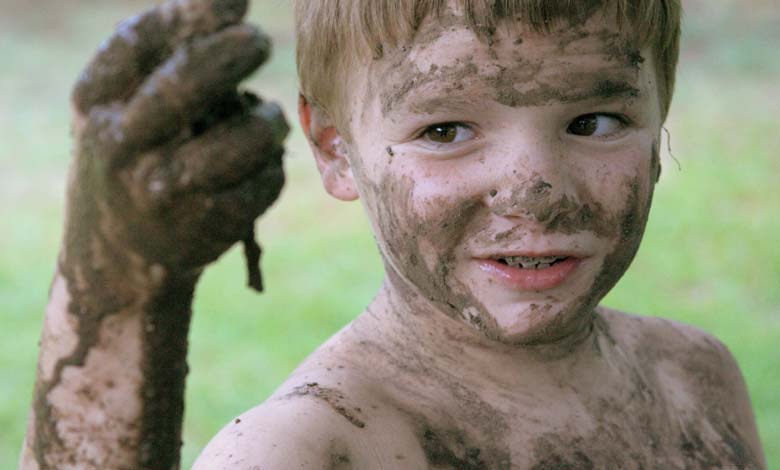How Playing in the Mud Boosts a Child’s Immune System

Medical Xpress has revealed evidence indicating that exposure to microbes found in dirt may help develop stronger immune systems and even reduce the risk of allergies and autoimmune diseases.
-
Playing in the Dirt: Is it Beneficial for Children’s Immune System?
-
Who are the 5 allies of the immune system?
According to the site, mud is not just a mix of soil and water but a complex ecosystem rich in microorganisms. One gram of soil can contain up to 10 billion microorganisms, representing thousands of potential species.
The diversity of bacteria, fungi, and other microbes in mud and soil plays a crucial role in our health and is key to what immunologists call “immune training.” This process enables the immune system to distinguish between harmful pathogens and benign environmental substances.
-
Ways to Boost Your Immune System Naturally: The Importance of Diet, Exercise, Sleep, and Stress Management”
-
Vitamins and minerals strengthen your immune system
During childhood, the immune system is particularly adaptable. When exposed to a wide range of microbes, it learns to strike a balance—responding vigorously to harmful invaders while leaving harmless substances like pollen or food particles alone.
However, lacking this training could lead to deteriorated immune systems.
-
“They must not miss them” : Doctors reveal the most important nutrients for children
-
“Concerning” Effects of Electronic Devices on Children’s Mental Health
According to the hygiene hypothesis, as societies become more urbanized and sanitized, our immune systems are deprived of the microbial challenges they need to develop properly. This can make the immune system overly sensitive, mistaking harmless substances—like pollen or dust—for dangerous invaders. This hypersensitivity can manifest in allergic conditions like asthma, eczema, or hay fever.

A lack of exposure to microbes, especially early in life, can also increase the likelihood of catching common colds and other childhood illnesses due to insufficient immune training for everyday pathogens.
-
An Isolated Population for Thousands of Years Develops a Genetic Mutation
-
Study: What You Eat Could Alter Your Children’s and Grandchildren’s Genes
This lack of immune training may explain why children growing up in sterile environments (such as cities with limited exposure to animals or nature) are up to 50% more likely to develop conditions like asthma or food allergies. Their immune systems, unchallenged by natural microbial exposure, may overreact to harmless triggers.
Moreover, without regular microbial interactions, the immune system may even attack the body itself, potentially contributing to autoimmune conditions such as type 1 diabetes or multiple sclerosis. Research even shows that children raised in environments with high microbial exposure—such as farms or homes with pets—are less likely to develop allergies or autoimmune diseases.
-
7 Reasons Children Lie to Their Parents
-
Astonishing Outcome: World’s first partial heart grown inside child

There are many reasons why exposure to microbes is extremely beneficial for children’s developing immune systems. For instance, bacilli commonly found in soil help produce an essential molecule for immune function.
Microbial exposure also helps children develop regulatory T cells—white blood cells that control how the immune system responds to foreign invaders and prevent autoimmune reactions. This may explain why a lack of microbial exposure increases the likelihood of autoimmune conditions (although this is just one of many contributing factors).
Immune Development
Playing in the mud is more than just a messy outdoor activity. It provides essential sensory experiences—touching, smelling, and manipulating different textures—that stimulate brain development and enhance emotional resilience.

Sensory activities (like playing in the mud) reduce stress in children, which is another crucial factor in maintaining a well-functioning immune system.
-
Learn About the Importance of “Independent” Play for Your Child
-
“Simple” Ways to Make Your Child Feel Special
Research also shows that the bacterium Mycobacterium vaccae, commonly found in soil, reduces inflammation and improves mood by influencing serotonin release, a key neurotransmitter. In animal studies, exposure to Mycobacterium vaccae reduced stress and anxiety symptoms. Emerging evidence suggests similar effects may occur in humans.

Moreover, outdoor play is a form of physical activity, which further supports immune health by enhancing blood circulation and stimulating immune cell production.
While some parents may worry about health risks associated with mud play, there are many ways to ensure safe outdoor activities for their children:
-
How to Deal with Temper Tantrums in Children
-
Benefits and Risks: How Artificial Intelligence Affects Children
- Choose clean play areas: Ensure that your child plays in areas unlikely to be contaminated by animal waste or harmful chemicals. Family gardens or parks are great options. If you’re unsure of the area’s cleanliness, you can use a soil test kit to check for harmful substances before playtime.
- Wear appropriate clothing for the mess: waterproof clothing like jackets and boots makes cleanup easier while allowing children to experience the benefits of outdoor play.
- Hand hygiene: washing hands after playing in the mud helps prevent harmful bacteria from entering the body, reducing the risk of infection while maintaining a healthy exposure to microbes.
- Frequent exposure: repeated exposure to beneficial microbes is essential for building a stronger immune system.
- Letting children get dirty while playing in mud may offer more than just fun; it might be a vital part of building a strong immune system.
- In an increasingly sanitized world, embracing nature, with all its dirt, may be exactly what our children’s immune systems need to thrive.












